SH0511
MISSION® shRNA Human Gene Family Set, Bacterial Glycerol Stock
Tumor Suppressors
Sign Into View Organizational & Contract Pricing
All Photos(1)
About This Item
UNSPSC Code:
41106609
NACRES:
NA.51
Recommended Products
product line
MISSION®
storage temp.
−70°C
Gene Information
Looking for similar products? Visit Product Comparison Guide
Related Categories
General description
The clones are sequenced-verified shRNA lentiviral plasmids (pLKO.1-puro) provided as 50 μl bacterial glycerol stocks (Terrific Broth, carbenicillin at 100 μg/ml and 15% glycerol). The set comes in 96-well plates that are barcoded for simple identification. A CD containing RefSeq, gene description, gene symbol, clone ID, hairpin sequence, locus link, and plate map positions are provided with the gene family set.
Other Notes
Each MISSION shRNA clone is constructed within the lentivirus plasmid vector, pLKO.1-Puro, followed by transformation into Escherichia coli. The pLKO.1-Puro vector contains bacterial (ampicillin) and mammalian (puromycin) antibiotic resistance genes for selection of inserts in either bacterial or mammalian cell lines. Each clone set consists of an average of 3-5 constructs that have been designed against each target gene using a proprietary algorithm. Therefore, a range of knockdown efficiency, with at least one construct from each gene set being >70%, can be expected when using these clones. This allows one to examine the effect of loss of gene function over a large series of gene knockdown efficiencies. Each shRNA construct has been cloned and sequence verified to ensure a match to the target gene.
For a detailed listing of other available gene family sets, visit the gene family set website.
Number of Genes: 73, Number of Clones: 443
The exact gene and clone count at time of purchase may vary slightly as the TRC library is continually updated.
Legal Information
Use of this product is subject to one or more license agreements. For details, please see http://sigmaaldrich.com/missionlicense .
MISSION is a registered trademark of Merck KGaA, Darmstadt, Germany
Storage Class Code
10 - Combustible liquids
WGK
WGK 3
Flash Point(F)
Not applicable
Flash Point(C)
Not applicable
Certificates of Analysis (COA)
Search for Certificates of Analysis (COA) by entering the products Lot/Batch Number. Lot and Batch Numbers can be found on a product’s label following the words ‘Lot’ or ‘Batch’.
Already Own This Product?
Find documentation for the products that you have recently purchased in the Document Library.
Cynthia Osborne et al.
The oncologist, 9(4), 361-377 (2004-07-22)
Carcinogenesis is a multistep process characterized by genetic alterations that influence key cellular pathways involved in growth and development. Oncogenes refer to those genes whose alterations cause gain-of-function effects, while tumor suppressor genes cause loss-of-function effects that contribute to the
Emanuela Vattemi et al.
Drug news & perspectives, 20(8), 511-520 (2007-12-15)
Cancer formation is a multistep process that involves the sequential activation of oncogenes as well as the inactivation of tumor suppressor genes often in the same clone of cells. These genetic changes generate concomitant phenotypic changes in the tumor cells
Jonathan C Berger et al.
Cancer biology & therapy, 4(8), 805-812 (2005-08-06)
In the past decade, findings from various disciplines of research have stimulated a reevaluation of fundamental concepts of the biology of metastasis. The convergence of two avenues of research has largely been responsible for this shift. First, clinical and experimental
Sheila A Stewart et al.
RNA (New York, N.Y.), 9(4), 493-501 (2003-03-22)
Genome-wide genetic approaches have proven useful for examining pathways of biological significance in model organisms such as Saccharomyces cerevisiae, Drosophila melanogastor, and Caenorhabditis elegans, but similar techniques have proven difficult to apply to mammalian systems. Although manipulation of the murine
Our team of scientists has experience in all areas of research including Life Science, Material Science, Chemical Synthesis, Chromatography, Analytical and many others.
Contact Technical Service








